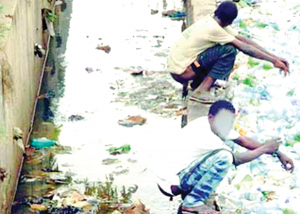World Toilet Day is commemorated annually on November 19, to raise awareness of the billions of people without access to proper sanitation.
The 2021 Population and Housing Census General Report on Water and Sanitation indicates that 1,477,747 households do not have access to a toilet facility.
It says some 5.5 million Ghanaians, continue to practice open defecation without shame as the government and assemblies look hopeless in fighting the canker towards sustainable development.
The figure represents 17.7% of the household population with the prevalence of open defaecation in rural areas – 31.3% – and 8.9% in the urban areas.
This is in a statement from the Ghana Statistical Service to mark World Toilet Day.
It said the percentage of households without access to toilet facilities was 19.3% in 2010 and 20.2% in 2,000 indicating a reduction of 2.5 percentage points in the prevalence of open defaecation over the 21-year period.
The regions with the highest proportion of households without access to toilet facilities are the Upper East region representing 80% and North East region with 79.7% where eight in every 10 households practices open defaecation.
There are six regions where more than 100,000 households are practising open defecation – Northern (242,034), Upper East (180,797), Ashanti (111,306), Greater Accra (105,717), Volta (102,997) and Bono East (102,442).
The point of defecation for households without access to a toilet facility is predominantly bush/open field/gutter (1,380,720 households) followed by beach/water bodes (61,401 households).
Sadly, 8,500 public schools in Ghana representing 26% have no toilet facilities, compelling pupils and students to engage in open defecation.
Painfully, however, a staggering 3,600 children die every year from lack of toilet-induced diseases like diarrhoea, cholera and typhoid fever, especially in developing countries.
The woefully inadequate staffing strength of the Rent Control Departments and Environmental Health Officers in the country coupled with poor logistics continue to hinder the fight against the menace.
As a result, most households or community members are not under any pressure to construct toilet facilities.
Citizens must intensify their demands from government to provide sufficient toilet facilities at all public places such as schools, health facilities, markets, state institutions and along major highways.
Championing this campaign through demonstrations, political activism and use of social media will be in the right direction.
Also, citizens should demand a percentage of the assembly’s common fund or internally generated fund (IGF) to support community-led initiatives in constructing toilets.
The media must sustain the naming and shaming approach on open defecation whilst praising communities who have achieved open defecation free status.
The various assemblies should immediately enforce that all worship places (Churches and Mosques) construct toilets facilities or cease to operate without them.
They should also effectively monitor and prosecute persons who flaunt the building code.
Additional communities can contribute through community saving approach (SUSU) to finance the construction of toilets.
The police should be assigned the task of conducting swoops in open defecation hotspots or areas for prosecution.
This will also serve as a deterrent.




